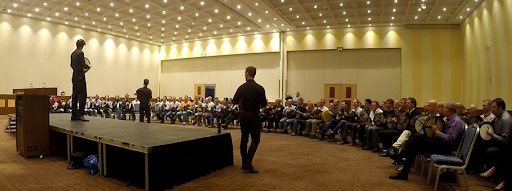In the dynamic landscape of modern workplaces, fostering a strong sense of teamwork and collaboration is essential for success. While traditional team-building activities abound, there is a unique and often overlooked tool that can foster camaraderie and cohesion: musical workshops. Far from being confined to concert halls or rehearsal studios, music has the power to unite people, ignite creativity, and strengthen bonds in the workplace setting. Let us explore how musical workshops can serve as a transformative team-building event, harmonising the efforts of individuals into a symphony of collaboration and success.
Breaking Down Barriers Through Music
Musical workshops provide a non-traditional setting for colleagues to interact and connect in a relaxed and enjoyable environment. Regardless of musical background or expertise, participants come together as equals, united by a common goal of creating music and having fun. Musical workshops provide a non-traditional setting for colleagues to interact and connect in a relaxed and enjoyable environment. Engaging in musical activities breaks down hierarchical barriers and fosters a sense of inclusivity and camaraderie, promoting open communication and mutual respect among team members.
Fostering Creativity and Innovation
Music is inherently creative, requiring participants to think outside the box, experiment with new ideas, and collaborate on the spot. Musical workshops challenge participants to improvise, compose, and arrange music together, stimulating creativity and innovation in problem-solving and idea generation.
Encouraging creative expression through music empowers employees to explore new perspectives, take risks, and embrace failure as part of the learning process, fostering a culture of innovation within the workplace.
Enhancing Communication and Collaboration
Music is a universal language that transcends cultural and linguistic barriers, making it an ideal medium for fostering communication and collaboration in diverse teams. Collaborative musical activities, such as ensemble playing or group singing, require participants to listen actively, communicate effectively, and coordinate their efforts to achieve a common musical goal. By working together to create music, team members learn to trust each other, rely on each other’s strengths, and adapt to each other’s cues, building a strong foundation for effective collaboration in the workplace.
Building Trust and Resilience
Musical workshops provide opportunities for employees to step out of their comfort zones, take on new challenges, and support each other through shared experiences. Collaborative music-making fosters trust and resilience as team members navigate through the ups and downs of the creative process together, learning to embrace mistakes and setbacks as opportunities for growth. Overcoming musical challenges as a team builds trust and confidence in each other’s abilities, strengthening the bonds of camaraderie and solidarity within the workplace.
Promoting Well-being and Stress Relief
Music has been shown to have powerful effects on mental and emotional well-being, reducing stress, anxiety, and tension while promoting relaxation and mindfulness.Engaging in musical activities during workshops provides employees with a much-needed break from the demands of work, allowing them to unwind, recharge, and rejuvenate their spirits. The shared joy and sense of accomplishment derived from making music together create a positive and uplifting atmosphere, fostering a sense of community and belonging among colleagues.
Celebrating Diversity and Inclusivity
Music workshops celebrate diversity and inclusivity by embracing the unique talents, perspectives, and backgrounds of all participants. Regardless of musical skill level or experience, everyone has something valuable to contribute to the musical ensemble, whether it be their voice, instrument, or creative ideas. By honouring individual differences and celebrating collective achievements, musical workshops foster a culture of appreciation and respect for diversity within the workplace.
Conclusion
In the symphony of the modern workplace, musical workshops stand as a harmonious melody that brings colleagues together, ignites creativity, and strengthens bonds of teamwork and collaboration. By engaging in collaborative music-making activities, employees not only enhance their communication skills, build trust, and foster innovation but also promote well-being, celebrate diversity, and create a positive and inclusive work environment.
As organisations strive to cultivate high-performing teams and nurture a culture of excellence, integrating musical workshops into their team-building initiatives offers a unique and transformative opportunity to strike a chord of harmony and unity in the workplace. So let the music play and watch as your team transforms into a symphony of success.





